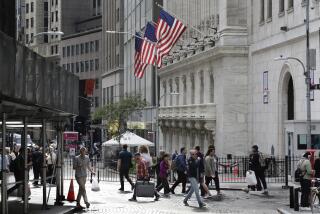FINANCIAL MARKETS : Weak Dollar, Inflation Fears Push Dow Down
The dollar resumed its fall against most major currencies Wednesday, causing worries on Wall Street that depressed stock prices.
The dollar slumped with anxiety over U.S. exposure to Mexico’s malaise, signs of inflation at home and voracious demand for the mighty German mark.
“There was pretty sad behavior on the dollar’s part today,” said Jay Wertheimer, a foreign exchange trader at the New York office of Italy’s Banco di Sicilia.
The dollar’s sinking reversed a partial rebound on Tuesday, when evidence that the U.S. economy could be slowing incited a strong rally in U.S. stocks and bonds, creating a higher demand for dollars needed to buy them.
Traders said the dominant theme in the foreign exchange market Wednesday was the unrelenting appetite for the German mark, now seen as the most secure currency for global investors to park their holdings.
In New York, the dollar fetched 1.390 German marks, down nearly 2% from Tuesday’s 1.417. The dollar hit a postwar low of 1.344 against the mark last week.
The dollar fetched 89.45 Japanese yen, down from 90.85 on Tuesday. The dollar also hit a postwar low of 88.78 against the yen last week.
The anemic Mexican peso, meanwhile, exacerbated worries about that country’s financial crisis and how it might hurt the U.S. economy. Mexico is the United States’ third-largest trading partner.
The peso closed 4.5% lower against the dollar Wednesday in a third straight day of falls. It took 6.95 pesos to purchase $1, up from 6.63 on Tuesday.
Stocks, meanwhile, retreated from Tuesday’s record highs as concern about the dollar and a government report of surprisingly strong wholesale inflation resurrected worry about interest rate increases.
The Dow Jones industrial average ended 10.38 points lower at 4,038.37, after narrowing a 20-point drop posted early in the session. In the broader market, declining issues led advancers by about 1,151 to 1,003 on the New York Stock Exchange. Big Board volume was moderately heavy at 337.15 million shares, down from 346.18 million on Tuesday.
Broad market indexes were mostly lower. The NYSE composite index eased 0.38 point to 266.15. The Standard & Poor’s 500-stock index fell 1.01 points to 491.88. The Nasdaq composite index slipped 0.86 point to 807.38.
Stocks headed lower early in the session, along with bonds, after the Labor Department reported that wholesale prices climbed 0.3% in February and the Commerce Department said industrial production jumped 0.5% for the month.
The price figures were much higher than analysts had predicted. In the producer price index, the most troubling figures were the 0.9% rise in intermediate goods and the 1.5% rise in crude goods.
That data had stock investors fearing that the Federal Reserve Board could raise short-term interest rates again. Higher rates raise corporate borrowing costs and can depress consumer spending, which would eventually push stock values lower.
The reports also cast doubt on the notion that the economy had been headed for a “soft landing”--that is, moderate growth with low inflation.
Bond prices turned around toward day’s end as market players apparently began to place more weight on earlier economic news--including Tuesday’s report of slow February retail sales, which would indicate a cooling economy.
Long-term Treasury bond yields retreated to close unchanged after bouncing higher early in the day.
The 30-year bond yield closed unchanged at 7.36%, a seven-month low. Its price--down 11/32 point, or $3.44 per $1,000 in face value in the early going--recovered to end unchanged from Tuesday’s close.
Among Wednesday’s market highlights:
* Goodyear Tire & Rubber fell 7/8 to 35 and China Tire Holding rose 1 1/2 to 10 1/4. China’s largest tire maker and two affiliates are suing Goodyear Tire & Rubber for $1 billion, alleging that the Akron, Ohio-based company robbed them of ownership of a Chinese factory.
* Gold companies rose amid further weakness in the dollar. Placer Dome was up 3/8 to 22 3/8, Barrick Gold gained 1/2 to 23 5/8 and Newmont Gold added 1/2 to 38 1/4.
* American Airlines’ parent, AMR, rose 1/8 to 61 5/8 after it announced it is cutting 900 jobs as part of a restructuring.
* Union Carbide said its 1995 first-quarter profits will exceed analysts’ estimates, and the shares rose 1 1/8 to 29 3/4.
* Amerada Hess sank 2 3/8 to 47 5/8; traders cited a Bear Stearns downgrading of the stock.
* Dart Group shares continued to perform solidly, climbing 5 1/4 to 95. The company announced Tuesday that it may sell its 50% stake in Shoppers Food Warehouse.
* Haggar slid 2 1/2 to 20 1/4 after it said its second-quarter earnings will be below those of a year ago.
* Steel stocks bucked the trend, rising on an announcement by USX-U.S. Steel that it will raise the price of its key products. USX-U.S. Steel rose 1 1/2 to 32 1/2. Inland Steel rose 1 3/8 to 26 3/8. Lukens added 1 1/8 to 27 5/8.
* Motorola fell 1 3/4 to 56 7/8 after Comcast’s cellular unit chose rival AT&T; to supply cellular network equipment--a setback to Motorola’s expansion efforts. AT&T; was unchanged at 52 1/8.
Overseas stocks closed mostly higher. Tokyo stocks shot up 421.01 points mainly because of arbitrage-linked buying, with the 225-share Nikkei index closing at 16,666.83.
In Frankfurt, the DAX 30-share average closed 9.69 points higher at 2,010.14. London’s FTSE-100 index closed down 3.6 points at 3047.0.
More to Read
Inside the business of entertainment
The Wide Shot brings you news, analysis and insights on everything from streaming wars to production — and what it all means for the future.
You may occasionally receive promotional content from the Los Angeles Times.










